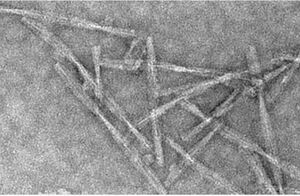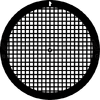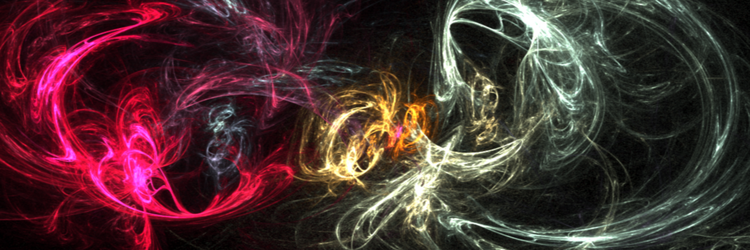OhioMod2013:Methods/Negative-Staining for TEM
From OpenWetWare
Jump to navigationJump to search
Negative-Staining for TEM
Prepare 2% Uranyl-Formate stain solution with 25 mM NaOH


- Materials:
- 0.1 g Uranyl-Formate powder. Always keep container in dark and minimize exposure to light!
- 10 ml ddH2O
- 5 μL 5M NaOH
- 0.2 μM syringe filter
- 10 ml syringe
- 12 ml falcon tubes (2x)
- aluminum foil
- 1.5 ml Eppendorf tubes.
- Procedure:
- Bring the ddH2O to boiling. Keep boiling for 2-3 minutes to de-oxygenate.
- weigh out 0.1 g UFo into a 12 ml falcon tube
- Add 5 ml of still-hot ddH2O to the UFo powder. Tightly close lid, wrap in aluminum foil and shake/vortex vigorously for 10 minutes. If the UFo powder was rather fresh, you should obtain a turbid-yellowish solution. As the UFo ages, the solutions typically appear more brownish.
- Filter solution through the 0.2 μM syringe filter. It should be clear now.
- Aliquot 1 ml of the solution into four separate Eppendorf tubes.
- Centrifuge at max speed for 5 minutes in a tabletop centrifuge.
- Wrap three of the four tubes in aluminum foil and freeze for later use.
- Add 5 μL of 5M NaOH to the remaining tube with 1 ml of stain solution and vortex immediately for two to three minutes.
- Spin again at top-speed for 3 minutes in a tabletop centrifuge.
- Wrap tube in aluminum foil, keep lid clear
- Stain solution is now ready for use!
- Comment:
- UFo solution can be stored at RT for ~10 days in the dark if no NaOH is added. After longer periods of storage precipitates/little crystals begin to appear, rendering the stain unusable for TEM. NaOH speeds up the degradation process, thus only add NaOH for immediate use.
Staining samples
- Materials:
- Whatman filter paper No 1. or No 2.
- tweezers/forceps
- parafilm
- ddH2O
- 2% UFo staining solution
- carbon-coated TEM grids(e.g. EFCF400-Cu-50, Science Services, Munich Germany)
- sample solution
- Procedure:
- Glow-discharge grids(e.g. glow discharger EMS 100, Electron Microscopy Sciences). Once may have to test different exposure settings in order to make the surface hydrophilic and sticky for DNA origami objects. LEt the grids cool to RT again.
- Put some water droplets on the bench and stick a 10x10 parafilm piece to it. This is now your clean working area.
- Grab a TEM grid with forceps
- Apply ~3 μL sample solution onto the carbon-coated side of the TEM grid. Let absorb for a while (3 to 4 minutes are good for ~ 1nM to dilute sample solutions).
- Meanwhile, apply a 25 μL stain solution droplet onto the parafilm
- Use filter paper edge to drain excess liquid from the edge of hte grid. DO not touch the grid surface. The remaining liquid film will evaporate in a few seconds, so act quickly.
- Immerse grid sample-side first into the stain-solution droplet. Incubate for 40 seconds.
- Use filter paper edge to dap off excess liquid from the edge of the grid. Don't touch the grid surface.
- Let the grid dry completely before injecting the TEM! (~30 minutes).
- Ready for imaging!
- Comments:
- Depending on the carbon quality, sample concentration/composition, incubation times may have to be varied. Washing hte grid with 0.5 MgCl2 prior to applying the sample can influence orientations on the grid (more views).
Preparing custom grids for TEM
Coat grids with a thin collodion plastic film
- Materials:
- Collodion
- minimum 20 cm diameter bowl/basin
- ddH2O
- TEM copper grids 200 or 400
- vellum paper (Pergament-Papier)
- tweezers, forceps
- razor blade
- 200 pipet
- Procedure:
- Completely fill basin with ddH2O right to the rim.
- Use razor blade to shorten a 200er pipet tip to create a 3mm diameter aperture.
- Pipet out 50 μL collodion solution.
- Eject the collodion from approx 10 cm onto the calm water surface. CAUTION: collodion is toxic! Ensure proper ventilation and hold breath while handling the collodion!
- A collodion film will spread across the water surface and harden. Wait for 5 min.
- Use forcepts to position copper grids onto the collodion film. Put shiny (specular-reflecting) side of the grids facing the collodion. Arrange in a neat hexagonal or square pattern.
- Position vellum paper on top of girds. Let soak with water.
- Put collodion film around the circumference of the vellum paper by using the razor blade.
- Carefully pick up the vellum paper at one corner/edge and pull out of the water.
- Turn the vellum paper with the grids facing up, put into petri dish, partially cover and let dry overnight in a clean dust free area.
- READY!
